Family
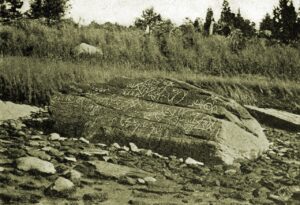
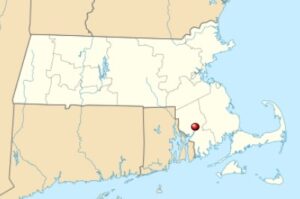 The Dighton Rock is a 40-ton boulder that was found in the riverbed of the Taunton River at located Berkley, Massachusetts, over 300 years ago. The rock has puzzling petroglyphs on it that have apparently never been able to be deciphered. Dighton Rock is one of the greatest mysteries of Massachusetts. The boulder is slanted and has six sides. It is approximately 5′ high, 9½’ wide, and 11′ long. All of those 300 years, people have wondered about the lines, geometric shapes, drawings, and writing that appear on the rock and who created them. They wanted to figure it out. What did it mean? Who made those markings, so many years ago. No one really knows how long ago the marks were made, only about how long ago it was found.
The Dighton Rock is a 40-ton boulder that was found in the riverbed of the Taunton River at located Berkley, Massachusetts, over 300 years ago. The rock has puzzling petroglyphs on it that have apparently never been able to be deciphered. Dighton Rock is one of the greatest mysteries of Massachusetts. The boulder is slanted and has six sides. It is approximately 5′ high, 9½’ wide, and 11′ long. All of those 300 years, people have wondered about the lines, geometric shapes, drawings, and writing that appear on the rock and who created them. They wanted to figure it out. What did it mean? Who made those markings, so many years ago. No one really knows how long ago the marks were made, only about how long ago it was found.
The rock has been studied by many people over the years. In 1680, English colonist Reverend John Danforth drew a copy of the petroglyphs. That drawing has been preserved in the British Museum, but there are conflicts as to the accuracy of the drawing. Some say the markings aren’t exactly the same as the rock. In something as intricate as petroglyphs, accuracy would be of vital importance. Ten years later, in 1690 Reverend Cotton Mather described the rock in his book, The Wonderful Works of God Commemorated: “Among the other Curiosities of New England, one is that of a mighty Rock, on a perpendicular side whereof by a River, which at High Tide covers part of it, there are very deeply Engraved, no man alive knows How or When about half a score Lines, near Ten Foot Long, and a foot and half broad, filled with strange Characters: which would suggest as odd Thoughts about them that were here before us, as there are odd Shapes in that Elaborate Monument…”
One theory suggests that Indigenous peoples of North America…who were known to have inscribed petroglyphs in rocks (a schematic face on the Dighton Rock is similar to an Indian petroglyph in Eastern Vermont) made the markings. A second theory suggests that Ancient Phoenicians made them was proposed in 1783 by Ezra Stiles in his “Election Sermon” as the “descendants of the sons of Japheth.” Still another theory suggests that the Norse might have made them. That theory was proposed by Carl Christian Rafn in 1837, but it was rejected by archaeologists such as TD Kendrick and Kenneth Feder. Others suggested that the Portuguese may have made them. That was proposed in 1912 by Edmund B Delabarre, who (after seeing Portuguese writing) believed that they then used the rock for their own inscriptions. Delabarre wrote that “markings on the Dighton Rock suggest that Miguel Corte-Real reached New England. Delabarre stated that the markings were abbreviated Latin, and the message, translated into English, reads as follows: “I, Miguel Cortereal, 1511. In this place, by the will of God, I became a chief of the Indians.'” Of his findings, Douglas Hunter wrote in his book “Reconstructing the 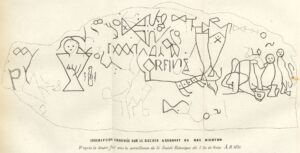
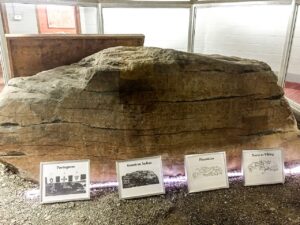 history of writing about Dighton Rock” provides copious evidence and analysis debunking the Corte-Real origin myth. Lastly, the Chinese have also been suggested as a possible source, proposed by Gavin Menzies in his 2002 book “1421: The Year China Discovered America.” I don’t think we’ll ever know who made them or what they mean.
history of writing about Dighton Rock” provides copious evidence and analysis debunking the Corte-Real origin myth. Lastly, the Chinese have also been suggested as a possible source, proposed by Gavin Menzies in his 2002 book “1421: The Year China Discovered America.” I don’t think we’ll ever know who made them or what they mean.
 A lighthouse is by definition, a tall building set on the coast with a light in its tower to warn ships of the presence of dangerous rocks or shores. I have long loved lighthouses…their history, the ships they protected, and the place you find them. These days, there might not be as much need for lighthouses, because of GPS, but GPS can fail, computers can crash, and some solar activity can affect GPS too. There are lots of reasons why it can fail, so these days, lighthouses might be considered a…backup plan. You never know when they might be needed, and that is not the time to find out that you don’t have them.
A lighthouse is by definition, a tall building set on the coast with a light in its tower to warn ships of the presence of dangerous rocks or shores. I have long loved lighthouses…their history, the ships they protected, and the place you find them. These days, there might not be as much need for lighthouses, because of GPS, but GPS can fail, computers can crash, and some solar activity can affect GPS too. There are lots of reasons why it can fail, so these days, lighthouses might be considered a…backup plan. You never know when they might be needed, and that is not the time to find out that you don’t have them.
The lighthouse at Sandy Hook, in what is now New Jersey, was put in use on June 11, 1764. It was needed badly, and the Provincial Congress of New York orchestrated two lotteries to raise money for its construction. As with many projects, things moved slowly. The lighthouse was first suggested for Sandy Hook nearly a century before, but it was finally initiated by Colonial Governor Edmund Andros. It finally became a priority 43 New York merchants, lost 20,000 pounds of sterling from shipwrecks in  early 1761. Suddenly, it was really important. to protect those ships and their cargo. In the 27 months that the light house at Sandy hook stood, she had protected many ships.
early 1761. Suddenly, it was really important. to protect those ships and their cargo. In the 27 months that the light house at Sandy hook stood, she had protected many ships.
Then, on March 6, 1776, a committee of the New York Provincial Congress instructs Major William Malcolm to dismantle the Sandy Hook lighthouse. The territory was in dispute, and Major Malcolm’s task was to prevent the lighthouse from helping the British to reach New York City. The Congress wanted Malcolm to remove the lens and lamps so that the lighthouse could no longer warn ships of the rocky shore. Major Malcolm succeeded. Colonel George Taylor reported six days later that Malcolm had “given him eight copper lamps, two tackle falls and blocks, and three casks, and a part of a cast of oil from the dismantling of the beacon.” While the removal would most certainly mean the loss of ships and lives, it was deemed collateral damage, even if some of the ships were friendlies.
While the lighthouse removal was a success, it did not keep the British from invading New York. They were soon  able to put the lighthouse back into service by installing lamps and reflectors. The Patriots attempted to knock the light out again on June 1, 1776, by placing cannon on boats and attempting to blow away the British equipment. They managed some damage before being chased away. The new states of New Jersey and New York bickered over ownership of the lighthouse, until the federal government assumed control of all US lighthouses in 1787. As of 1996, the Sandy Hook lighthouse, the oldest original lighthouse in the United States, passed into the jurisdiction of the National Park Service. I’m glad it survived all that turmoil. It would be sad if it was lost forever.
able to put the lighthouse back into service by installing lamps and reflectors. The Patriots attempted to knock the light out again on June 1, 1776, by placing cannon on boats and attempting to blow away the British equipment. They managed some damage before being chased away. The new states of New Jersey and New York bickered over ownership of the lighthouse, until the federal government assumed control of all US lighthouses in 1787. As of 1996, the Sandy Hook lighthouse, the oldest original lighthouse in the United States, passed into the jurisdiction of the National Park Service. I’m glad it survived all that turmoil. It would be sad if it was lost forever.
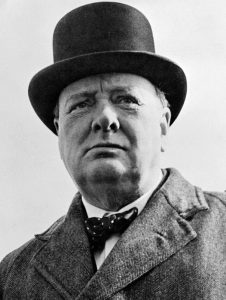
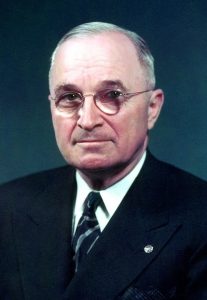 “Who was Winston Churchill?” It’s not a question you often hear, because Winston Churchill had a presence. His features were distinct, but he was not a big man. Churchill stood 5’6½” tall and weighed 187 pounds. He was maybe 35 pounds overweight, but not in bad health, especially considering he smoked as many as ten cigars a day, and when you consider that he lived to be 90 years old, it would seem that none of the normal “risk factors” applied to Winston Churchill. He dealt with daily stress, poor eating habits, excess weight, and smoking, but outlived many people in this era or that. How people felt about Winston Churchill, depended on which side of the subject in question they were on. When he made up his mind on a matter, he rarely changed his mind, and he didn’t back down.
“Who was Winston Churchill?” It’s not a question you often hear, because Winston Churchill had a presence. His features were distinct, but he was not a big man. Churchill stood 5’6½” tall and weighed 187 pounds. He was maybe 35 pounds overweight, but not in bad health, especially considering he smoked as many as ten cigars a day, and when you consider that he lived to be 90 years old, it would seem that none of the normal “risk factors” applied to Winston Churchill. He dealt with daily stress, poor eating habits, excess weight, and smoking, but outlived many people in this era or that. How people felt about Winston Churchill, depended on which side of the subject in question they were on. When he made up his mind on a matter, he rarely changed his mind, and he didn’t back down.
He was responsible for one of the most famous speeches of the Cold War period. It was a speech in which former British Prime Minister Winston Churchill condemned the Soviet Union’s policies in Europe and declared, “From Stettin in the Baltic to Trieste in the Adriatic, an iron curtain has descended across the continent.” Churchill’s Cold War speech is one of the “opening volleys” announcing the beginning of the Cold War. When he was defeated for re-election as prime minister in 1945, he was invited to Westminster College in Fulton, Missouri, which is where he gave this speech. President Harry S Truman joined Churchill on the platform and listened intently to his speech. Expressing praise for the United States, Churchill declared that the United States stood “at the pinnacle of world power.” England and the United States have long had a “friendly, but competitive relationship,” and it would soon become quite clear that a primary purpose of his talk was to argue for an even closer “special relationship” between the United States and Great Britain…the two great powers of the “English-speaking world.” But, would it be in the best interest of the United States to agree?
World War II had ended, and as in any post war situation, things were still pretty chaotic. Nevertheless, it was necessary to set policies, and to organize the losing countries so that things didn’t escalate out of control 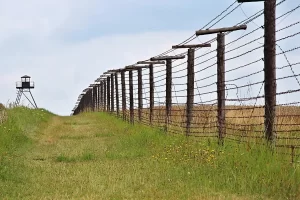
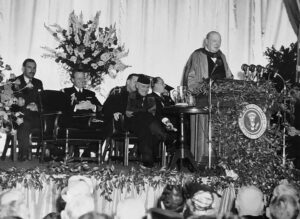 again…not an easy task. The Soviet Union was well known for its expansionistic policies and was unlikely to stop trying to take over its neighbors without some kind of intervention. In addition to the “iron curtain” that had descended across Eastern Europe, Churchill spoke of “communist fifth columns” that were operating throughout western and southern Europe. Churchill compared the Soviet Union to disastrous consequences of the appeasement of Hitler prior to World War II, saying that in dealing with the Soviets there was “nothing which they admire so much as strength, and there is nothing for which they have less respect than for military weakness.” Therefore, without intervention, they would quickly get back to the same disastrous practices they used before, and the war would have to fought all over again.
again…not an easy task. The Soviet Union was well known for its expansionistic policies and was unlikely to stop trying to take over its neighbors without some kind of intervention. In addition to the “iron curtain” that had descended across Eastern Europe, Churchill spoke of “communist fifth columns” that were operating throughout western and southern Europe. Churchill compared the Soviet Union to disastrous consequences of the appeasement of Hitler prior to World War II, saying that in dealing with the Soviets there was “nothing which they admire so much as strength, and there is nothing for which they have less respect than for military weakness.” Therefore, without intervention, they would quickly get back to the same disastrous practices they used before, and the war would have to fought all over again.
The speech was well received by Truman and many other US officials. Everyone knew the truth, and somebody simply had to come right out and say it. They had decided that because the Soviet Union was determined to expand, only a tough stance on a united front would deter the Russians. Churchill’s “iron curtain” phrase immediately entered the official vocabulary of the Cold War. It was a term everyone knew, and it perfectly described the problem. Of course, agreeing with Churchill, didn’t necessarily mean that the US officials enthusiastic about Churchill’s call for a “special relationship” between the United States and Great Britain. They weren’t concerned that Great Britain would again try to have some influence over the United States, but rather they were well aware that Britain’s power was weakening, and the US had no intention of being used as pawns to help support the crumbling British empire.
Of course, the Russian leader Joseph Stalin had a very different view of the speech, saying that it was “war 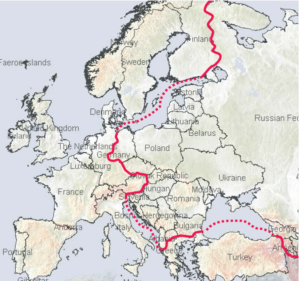
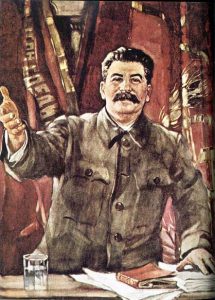 mongering” and referred to Churchill’s comments about the “English-speaking world” as imperialist “racism.” The British, Americans, and Russians, all of whom were allies against Hitler less than a year before the speech, were now drawing the battle lines of the Cold War. It didn’t take long for the similarities between Hitler and the Soviet Union to become glaringly clear, and they had to be stopped. I don’t know why dictators feel the need to enslave other people. The “Iron Curtain” would “come down” like all other forms of tyranny must eventually do, but unfortunately, a lot of lives are lost before victory is achieved.
mongering” and referred to Churchill’s comments about the “English-speaking world” as imperialist “racism.” The British, Americans, and Russians, all of whom were allies against Hitler less than a year before the speech, were now drawing the battle lines of the Cold War. It didn’t take long for the similarities between Hitler and the Soviet Union to become glaringly clear, and they had to be stopped. I don’t know why dictators feel the need to enslave other people. The “Iron Curtain” would “come down” like all other forms of tyranny must eventually do, but unfortunately, a lot of lives are lost before victory is achieved.

 My sister-in-law, Rachel Schulenberg left us all too soon just over three years ago. She was just 45 years old. We all felt her loss quite deeply. Rachel was a kind soul, who loved everyone. She had worked at a church in Powell, before she was introduced to my brother-in-law, Ron Schulenberg. When they were married, she moved to Casper, where Ron lived. Prior to that, and even after her marriage, Rachel could often be found talking to people about Jesus. She was sold out to the Lord, which of course, makes me thankful, because we know where she is, and that we will see her again. While we know that is the case, it doesn’t mean that we miss her less. Rachel is the kind of person who makes her mark on your heart, and it never goes away.
My sister-in-law, Rachel Schulenberg left us all too soon just over three years ago. She was just 45 years old. We all felt her loss quite deeply. Rachel was a kind soul, who loved everyone. She had worked at a church in Powell, before she was introduced to my brother-in-law, Ron Schulenberg. When they were married, she moved to Casper, where Ron lived. Prior to that, and even after her marriage, Rachel could often be found talking to people about Jesus. She was sold out to the Lord, which of course, makes me thankful, because we know where she is, and that we will see her again. While we know that is the case, it doesn’t mean that we miss her less. Rachel is the kind of person who makes her mark on your heart, and it never goes away.
Rachel left behind her husband, Ron and three children, and at that time, two grandchildren, Lucas Iverson and Zoey Iverson. She would be thrilled to know that she now has four grandchildren, and a bonus grandson. In addition to Lucas and Zoey, Ryder Birky and Alicen Burr, were born in 2022 and 2023 respectively. Also, Riley’s fiancée, Sierah Martin, had a son, Jace Swan from a prior relationship. I know that her children, Cassie Franklin 
 (Wesley Burr), Riley Birky (Sierah Martin), and Tucker Schulenberg (when he has kids) will all tell their children about their sweet grandmother. They need to be told how very special she was, and how thrilled she was to be a grandmother. I will never forget when Lucas was born, and she first became a grandmother. Lucas was early and very small, and she couldn’t wait to meet him. I’m sure she is looking forward to meeting all of them one day.
(Wesley Burr), Riley Birky (Sierah Martin), and Tucker Schulenberg (when he has kids) will all tell their children about their sweet grandmother. They need to be told how very special she was, and how thrilled she was to be a grandmother. I will never forget when Lucas was born, and she first became a grandmother. Lucas was early and very small, and she couldn’t wait to meet him. I’m sure she is looking forward to meeting all of them one day.
Rachel would not only be very proud of her grandchildren, but her children as well. Each of them has gone through some adversity, and they have persevered to come out on top on the other side of their problems. Rachel raised so very strong human beings, and I believe that they will live successful lives that their mother would be very proud of. They are highly motivated to live lives of which their mother would be proud, and that makes me very proud of them. These kids, who are mostly not kids anymore, have become responsible adults…people Rachel would have been really proud of. Of course, she was always proud of her kids. They were always 
 her pride and joy, and she knew that they were going to be ok, because she had trained them to be strong people. I just really wish she could have been her to play with these sweet little grandbabies. Life goes on after a loss, and we must go on with it. I heard an old saying once, in reference to the loss of a loved one. When asked how you get over it, and the answer was, “You don’t get over it…you get on with it.” Truer words were never spoken. While Rachel is no longer her with us, the memories of the good times are, and we will cherish those forever. Happy birthday in Heaven, Rachel. We love and miss you very much.
her pride and joy, and she knew that they were going to be ok, because she had trained them to be strong people. I just really wish she could have been her to play with these sweet little grandbabies. Life goes on after a loss, and we must go on with it. I heard an old saying once, in reference to the loss of a loved one. When asked how you get over it, and the answer was, “You don’t get over it…you get on with it.” Truer words were never spoken. While Rachel is no longer her with us, the memories of the good times are, and we will cherish those forever. Happy birthday in Heaven, Rachel. We love and miss you very much.
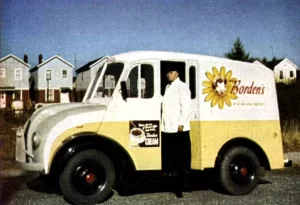
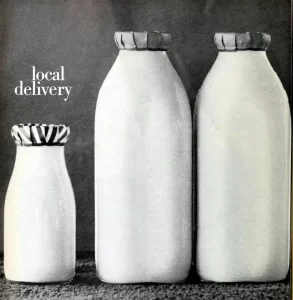 In the 1950s, most people got their milk delivered early in every morning or sometimes every few mornings. If they were one of the fortunate few, they might also have eggs delivered. That was just how it was done back then. Almost like the summertime ice cream truck many of us remember from our childhood years, you could see the milkman all over town. It was a totally separate business. Milk was not found in the grocery stores, but rather came directly from the creamery. In some ways, I think it is sad that those days are gone now. When I was a little girl…actually a baby, my dad, Allen Spencer worked in a creamery in Superior, Wisconsin. I don’t remember it, of course, but I always found it interesting. My sister, Cheryl Masterson remembers it though. She told me that Dad “worked at the creamery. He loaded and delivered tankers of milk to the places that bottled the milk. He washed and cleaned out his own tank after the deliveries, too. I remember being there sometimes at night when they sprayed them out. That was at Twin Port Dairy.”
In the 1950s, most people got their milk delivered early in every morning or sometimes every few mornings. If they were one of the fortunate few, they might also have eggs delivered. That was just how it was done back then. Almost like the summertime ice cream truck many of us remember from our childhood years, you could see the milkman all over town. It was a totally separate business. Milk was not found in the grocery stores, but rather came directly from the creamery. In some ways, I think it is sad that those days are gone now. When I was a little girl…actually a baby, my dad, Allen Spencer worked in a creamery in Superior, Wisconsin. I don’t remember it, of course, but I always found it interesting. My sister, Cheryl Masterson remembers it though. She told me that Dad “worked at the creamery. He loaded and delivered tankers of milk to the places that bottled the milk. He washed and cleaned out his own tank after the deliveries, too. I remember being there sometimes at night when they sprayed them out. That was at Twin Port Dairy.”
These days the idea of the milkman and milk delivery are long since behind us, but the idea of delivery is not…it 
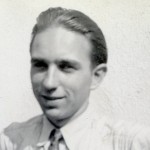 has just been revamped. When Covid-19 struck, and people were told to stay home (except for essential workers), delivery was revamped. Suddenly, people who were supposed to stay home found themselves needing things, so the only available solution was delivery. People were having food delivered, groceries delivered, even alcohol became a delivery item. Of course, companies like Amazon already existed, and delivered many items to people who didn’t want to go shop, or who wanted to save money on things. Now, suddenly the post office, UPS, and FedEx were delivering many essential items to people.
has just been revamped. When Covid-19 struck, and people were told to stay home (except for essential workers), delivery was revamped. Suddenly, people who were supposed to stay home found themselves needing things, so the only available solution was delivery. People were having food delivered, groceries delivered, even alcohol became a delivery item. Of course, companies like Amazon already existed, and delivered many items to people who didn’t want to go shop, or who wanted to save money on things. Now, suddenly the post office, UPS, and FedEx were delivering many essential items to people.
After Covid faded into the past, the delivery system, somehow didn’t. People still have many things delivered. Many grocery stores also have pick up services, making people their own delivery driver. My daughter, Amy Royce and granddaughter, Shai Royce haven’t shopped for a week’s worth of groceries since Covid. My sister, Cheryl hasn’t either. They put in their orders, and they pick up their groceries the next day. My other daughter, 
 Corrie Petersen and her husband, Kevin have theirs delivered to their house. People are so busy these days, that convenience is the key to a peaceful life. Whenever we go out to breakfast, we see delivery drivers picking up to go orders for delivery to their clients. People just love the convenience of having their food delivered while they stay home in their jammies, I guess. I can understand that, but we still like to go in and shop for our own groceries.
Corrie Petersen and her husband, Kevin have theirs delivered to their house. People are so busy these days, that convenience is the key to a peaceful life. Whenever we go out to breakfast, we see delivery drivers picking up to go orders for delivery to their clients. People just love the convenience of having their food delivered while they stay home in their jammies, I guess. I can understand that, but we still like to go in and shop for our own groceries.
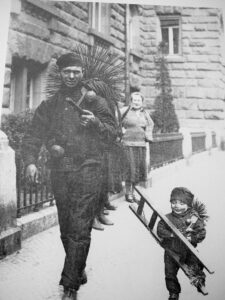
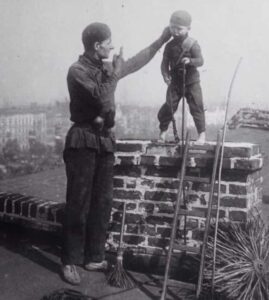 Perhaps one of the most questionable of all professions undertaken by children in the past was that of chimney sweeping. Not only were children exploited in this job, mostly because of their small stature, but since proper safety measures were not taken in those days, the children in those jobs had health problems for the rest of their lives, and very likely they died young. The use of children as chimney sweeps began in the late 1600s in England, after the Great Fire of London, which gutted the city. At that time, building codes changed, requiring chimneys to be much narrower than they were previously. The idea was to keep more of the sparks in than out.
Perhaps one of the most questionable of all professions undertaken by children in the past was that of chimney sweeping. Not only were children exploited in this job, mostly because of their small stature, but since proper safety measures were not taken in those days, the children in those jobs had health problems for the rest of their lives, and very likely they died young. The use of children as chimney sweeps began in the late 1600s in England, after the Great Fire of London, which gutted the city. At that time, building codes changed, requiring chimneys to be much narrower than they were previously. The idea was to keep more of the sparks in than out.
The new design brought with it a bigger problem…keeping the chimneys free of obstruction, which became more of a challenge and a priority. Amazingly, instead of someone inventing a tool for this purpose, children were employed as human chimney sweeps. Their small stature allowed them to go inside the chimneys and manually sweep away the soot. Thus practice went on for over 200 years, in spite of the deplorable conditions the children lived in, the horrible health effects they suffered, and the many injuries and fatalities resulting from related work hazards.
One former chimney sweep, James Seaward was interviewed in December 1909, by the Toronto Saturday Night, a Canadian publication. Seaward was living in Wokingham, where he had just been named alderman of the town’s Borough Council. Seaward was one of the fortunate few that were still alive after working as a chimney sweep for 58 years. He started when he was just six. Seaward tells how he “was only six years old when I went up my first chimney. I was an orphan and I fell into the hands of a chimney sweep, and a cruel master he was. I have known what it was to have straw lighted under me and pins stuck into the soles of my feet to force me up a chimney; and I have known, too, what it was to come down covered with blood and soot after climbing with my knees and elbows. No one knows the terrible cruelty inflicted on boys in those days. 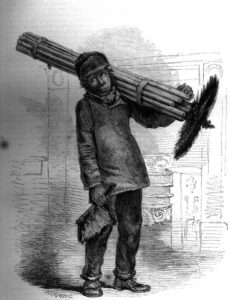
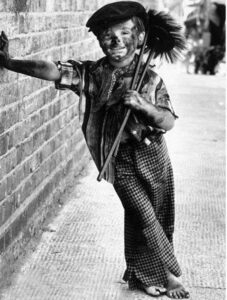 They used to be steeped in strong brine to harden their flesh. In my own case soda was used. Sometimes I used to have to stay up a difficult chimney five or six hours at a stretch.”
They used to be steeped in strong brine to harden their flesh. In my own case soda was used. Sometimes I used to have to stay up a difficult chimney five or six hours at a stretch.”
Somehow, Seaward managed to survive, and to actually prosper, even is such deplorable conditions. Thankfully, such cruelty was outlawed during the nineteenth century, with laws introduced regarding child labor. Those laws didn’t address chimney sweeps specifically, but rather child labor in general. The things that were allowed in the past concerning child labor were just awful, and orphans were specifically targeted, because they had little protections over their lives. They were often “adopted” out, but their “new parents” sometimes just wanted slave labor.

 When Bob Schulenberg and I met a little more than 50 years ago, we had no idea where our lives were headed. I first met Bob in December of 1973. I was still in high school and he was just out of high school. We had attended rival high schools, which explains why we hadn’t met sooner. Our relationship started off a little rocky, when he thought I didn’t like him. Nevertheless, with the help of his sister, Debbie Cook, we got him convinced, and the rest is history.
When Bob Schulenberg and I met a little more than 50 years ago, we had no idea where our lives were headed. I first met Bob in December of 1973. I was still in high school and he was just out of high school. We had attended rival high schools, which explains why we hadn’t met sooner. Our relationship started off a little rocky, when he thought I didn’t like him. Nevertheless, with the help of his sister, Debbie Cook, we got him convinced, and the rest is history.
While Bob was a little shy to begin with, we quickly became best friends. I simply can’t imagine us any other way. We love the same things, and we are very comfortable together. We love to hike, and I was asked at one time, how we 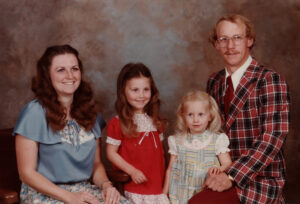 could find things to talk about on those long walks. The truth is that after all these years together, we don’t have to talk the whole time. We often know exactly what our BFF is thinking before words are even spoken. We point out the same things, and we notice the same things…on the trail and off. Things go the same way at home. Of course, we do a lot of talking, but the quiet is ok too. We are comfortable talking when there is something to say, and enjoying the quiet when there isn’t.
could find things to talk about on those long walks. The truth is that after all these years together, we don’t have to talk the whole time. We often know exactly what our BFF is thinking before words are even spoken. We point out the same things, and we notice the same things…on the trail and off. Things go the same way at home. Of course, we do a lot of talking, but the quiet is ok too. We are comfortable talking when there is something to say, and enjoying the quiet when there isn’t.
We also have hobbies of our own, so when Bob is working on a car in the garage, I might be found writing a story for my blog in the house. It’s all good. We support each other in whatever endeavors we take on. We both know that we have things we like that are different than our other half. We aren’t clones, after all. So, while we 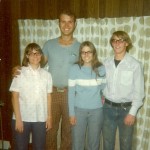
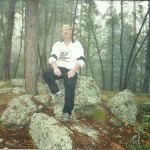 are both retired, we also like our own time with things. I think we have a very healthy relationship. We both love to take trips to places Washington state to visit our daughter, Amy Royce’s family; Thermopolis (our anniversary spot); and the Black Hills. Nevertheless, we are also very happy just being together…right there at home. When we got married, we knew that we wanted to spend the rest of our lives together, and it is a decision we have never regretted. Today is our 49th anniversary. Happy anniversary Bob!! I love you very much, and I am so happy to be sharing my life with you!!
are both retired, we also like our own time with things. I think we have a very healthy relationship. We both love to take trips to places Washington state to visit our daughter, Amy Royce’s family; Thermopolis (our anniversary spot); and the Black Hills. Nevertheless, we are also very happy just being together…right there at home. When we got married, we knew that we wanted to spend the rest of our lives together, and it is a decision we have never regretted. Today is our 49th anniversary. Happy anniversary Bob!! I love you very much, and I am so happy to be sharing my life with you!!
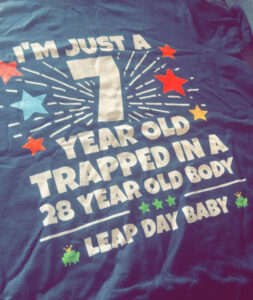
 When you only get a birthday every four years, you realize just how special a birthday is. Most people get a birthday every year. It’s just expected, but when your birthday falls on Leap Day, things are different. Nevertheless, most people who have a Leap Day birthday really like it. I suppose that technically they have as many years behind them as the rest of us, but the reality is that their birthday is absolutely missing three years out of four.
When you only get a birthday every four years, you realize just how special a birthday is. Most people get a birthday every year. It’s just expected, but when your birthday falls on Leap Day, things are different. Nevertheless, most people who have a Leap Day birthday really like it. I suppose that technically they have as many years behind them as the rest of us, but the reality is that their birthday is absolutely missing three years out of four.
As a little girl, my granddaughter, Shai Royce wasn’t sure she liked her day, or actually it was her brother Caalab Royce, and cousins, Chris and Josh Petersen telling her that they were older than her, when the only one who truly was older was Chris and that by only one day, which in her mind didn’t really make him “that much older!!” Now, I think she thought totally embraces the day, and on the off years, she celebrates for two days…the February 28th and March 1st. This year, she actually got to do a little celebrating all month long!! Shai’s friend Tia gave her a small gift for each day. Each gift was well thought out and it was obvious that Tia put a lot of 
 thought into each gift, making them very personalized. It made Shai feel so special. Another thing that makes Shai feel special, is the dogs she takes care of for some of her friends. She loves the dogs she watches…and boy, do they love her. They have definitely stolen her heart.
thought into each gift, making them very personalized. It made Shai feel so special. Another thing that makes Shai feel special, is the dogs she takes care of for some of her friends. She loves the dogs she watches…and boy, do they love her. They have definitely stolen her heart.
So, for her birthday, Shai; her mom, Amy Royce; and brother, Caalab Royce and going to a Seattle Kraken hockey game tonight. I have been to games, but never a hockey game. I know they will have a great time, and I hope the Kraken win. I did a little research on them, and they are the newest team in the National Hockey League. It will be a great time, I’m sure. Shai is a very social person, but I never really thought of her as a big sports fan. Still, since her family moved to northern Washington, they have gone to a number of games…mostly 
 local teams, but things can change quickly. Once you’ve gone to a game, most people want to go to another game.
local teams, but things can change quickly. Once you’ve gone to a game, most people want to go to another game.
Shai loves to go the casinos near her home. Somehow, she and her family do very well in the casinos. They come home winners quite often, and not just twenty bucks either. A few days ago, she was invited to her parents’ poker night for the first time, and to everyone’s shock, she won. Her mom doesn’t play poker, because in her own words, she has too many tells, but Shai certainly doesn’t. Like her dad, Travis Royce, she can totally keep a straight face. Some people have it and some people don’t. Today is Shai’s 7th @ 28th birthday. Happy birthday Shai!! Have a great day!! We love you!!

 My grandson, Chris Petersen was the child that made me a grandmother. As a matter of fact, he also made his mother, Corrie Petersen a mom, and his great grandmother, Joann Schulenberg a great grandmother…on her birthday. His dad, Kevin Petersen, grandpa Bob Schulenberg, and great grandpa, Walt Schulenberg also had some firsts when Chris was born. First time dad, grandpa, and great grandpa. We are all so happy to begin this new stage of our lives. Chris and our other grandchildren have been such a blessing to us.
My grandson, Chris Petersen was the child that made me a grandmother. As a matter of fact, he also made his mother, Corrie Petersen a mom, and his great grandmother, Joann Schulenberg a great grandmother…on her birthday. His dad, Kevin Petersen, grandpa Bob Schulenberg, and great grandpa, Walt Schulenberg also had some firsts when Chris was born. First time dad, grandpa, and great grandpa. We are all so happy to begin this new stage of our lives. Chris and our other grandchildren have been such a blessing to us.
Of course, Chris is an adult now. Why do kids have to grow up? Chris works as the store manager of Auto Zone in Casper, Wyoming. He really loves his job, which makes sense, since his favorite hobby is mechanics. Well, that and video games, but doesn’t everyone play video games. He is a great manager, and they are very happy to have him. I think he has brought with him, a 
 number of new clients for Auto Zone, especially his dad and grandpa, who do a lot of business there.
number of new clients for Auto Zone, especially his dad and grandpa, who do a lot of business there.
The biggest part of Chris growing up, however, is that he is married to his beautiful wife, Karen Petersen. They have three beautiful children, Cambree, Caysen, and Cyler, and they are very happy and blessed. We are all very blessed, and of course, we know that if Chris had not grown up, we couldn’t have ever had these precious babies. His family is the most important part of Chris’ lives. They have totally transformed his life in every way. So, I guess we will just be happy that he did grow up, and now his family…and those babies. Chris is so settled now, and I can see that he is so very happy. Chris and Karen are a perfect match for each other. It’s definitely a match made in Heaven. They like the same things, and they are headed in the same direction. You can tell when a man is happy, when all he 
 wants to do is get home to his family. As with most married men, that old lifestyle is suddenly not very important. That makes perfect sense to me.
wants to do is get home to his family. As with most married men, that old lifestyle is suddenly not very important. That makes perfect sense to me.
I am so happy for Chris in his new life. I love seeing him and Karen so happy. They both have a great sense of humor, and their kids are happy and well rounded. It is such a blessing to see your kids and grandkids so happy in their lives. Today is Chris’ birthday. Happy birthday Chris!! Have a great day!! We love you!!
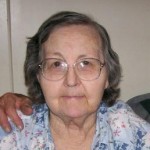
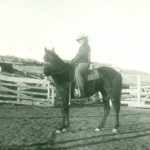 When I met my mother-in-law, Joann Schulenberg for the first time, I wonder what she thought of me. It’s not that my mother-in-law was a snob or anything, because she certainly wasn’t. Nevertheless, I was just 17 years old, so I could have seemed like a frivolous teenager. As I got to know her better, she would say things like, “You have never canned vegetables?” or “You don’t make your own clothes?” Well, the reality was that I was a teenaged city girl, and she was a country girl. In addition, I was from a completely different generation than she was. She had lives through the depression era, when food was scarce, as were many other things. People did what they had to in order to survive. An experience like that is not something people forget easily. It wasn’t that I had never cooked or even helped make jelly, but living in town, we didn’t have the space for a garden, and so didn’t have the vegetables to can. I also knew how to sew, but I have never liked it. Hmmm…maybe I was a frivolous teenaged girl.
When I met my mother-in-law, Joann Schulenberg for the first time, I wonder what she thought of me. It’s not that my mother-in-law was a snob or anything, because she certainly wasn’t. Nevertheless, I was just 17 years old, so I could have seemed like a frivolous teenager. As I got to know her better, she would say things like, “You have never canned vegetables?” or “You don’t make your own clothes?” Well, the reality was that I was a teenaged city girl, and she was a country girl. In addition, I was from a completely different generation than she was. She had lives through the depression era, when food was scarce, as were many other things. People did what they had to in order to survive. An experience like that is not something people forget easily. It wasn’t that I had never cooked or even helped make jelly, but living in town, we didn’t have the space for a garden, and so didn’t have the vegetables to can. I also knew how to sew, but I have never liked it. Hmmm…maybe I was a frivolous teenaged girl.
Nevertheless, my mother-in-law never looked down on me, but rather I think she had found a “new student” to 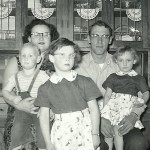 teach. When I married into the family, I was introduced many new things. I learned canning, some gardening, and even raising cows for family use. Still, you really can’t take the city out of the girl, even if, for a time, you take the girl out of the city. Just like moving her to the city, didn’t take the country out of her. While I can do those things, I can’t say that I love doing those things. Sorry Mom!! Nevertheless, I loved reaping the benefits of her many talents, like knitting, crocheting, canning, baking (from scratch), sewing, and cooking.
teach. When I married into the family, I was introduced many new things. I learned canning, some gardening, and even raising cows for family use. Still, you really can’t take the city out of the girl, even if, for a time, you take the girl out of the city. Just like moving her to the city, didn’t take the country out of her. While I can do those things, I can’t say that I love doing those things. Sorry Mom!! Nevertheless, I loved reaping the benefits of her many talents, like knitting, crocheting, canning, baking (from scratch), sewing, and cooking.
When my mother-in-law began to develop Alzheimer’s Disease, we were all saddened. So much of who she was in the past, began to drift away. Still, some of the best memories of her life stayed with her, and for that we were blessed. True, most of the memories were from her distant past, but those were the ones that we didn’t know about. Her life as a girl, things her parents did, places she lived, horses she loved, and stories about her children’s past too. We found a new part of her and a new way to be blessed by her. Mom changed with Alzheimer’s Disease, but she did not get irritable like many people did. She was sweet and accommodating…if you didn’t ask her to get up and walk. She did require a lot of care and 
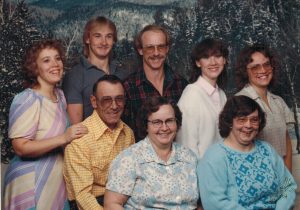 eventually we had no choice, but to place her in a nursing home. She didn’t mind. She was a “people watcher” and so it was a good fit. She didn’t walk the last 4½ years of her life, which might have contributed to her good mood. I think, in the end, she appreciated me more, because as her caregiver, I honestly did my best for her…as did our whole team. Today would have been my mother-in-law’s 93rd birthday. Happy birthday in Heaven, Mom. We love and miss you very much.
eventually we had no choice, but to place her in a nursing home. She didn’t mind. She was a “people watcher” and so it was a good fit. She didn’t walk the last 4½ years of her life, which might have contributed to her good mood. I think, in the end, she appreciated me more, because as her caregiver, I honestly did my best for her…as did our whole team. Today would have been my mother-in-law’s 93rd birthday. Happy birthday in Heaven, Mom. We love and miss you very much.

